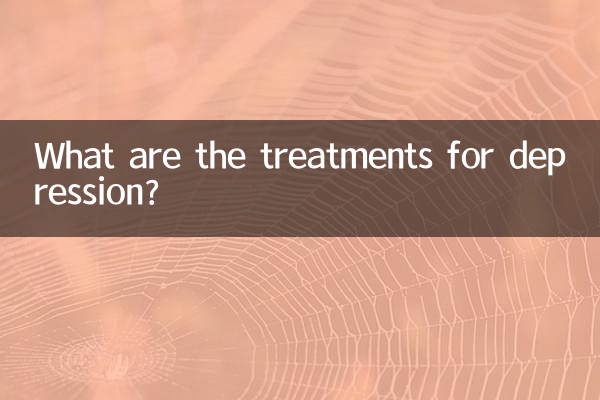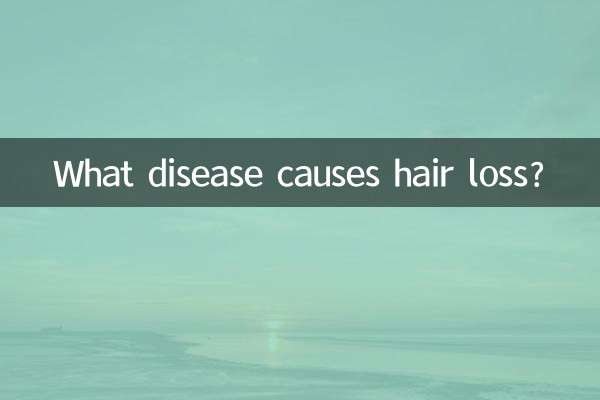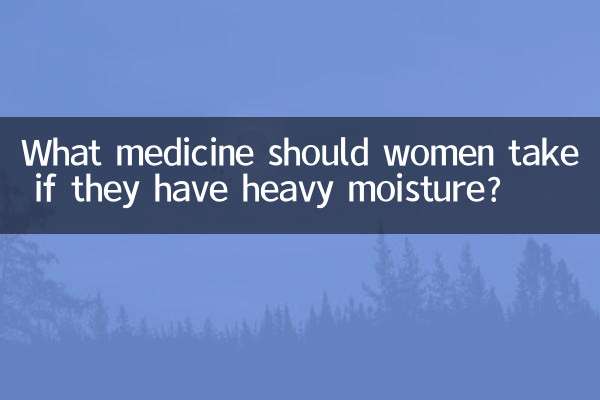What are the treatments for depression?
Depression is a common mental health problem that has attracted widespread attention globally in recent years. With the increase in social pressure and the accelerated pace of life, the incidence of depression is increasing year by year. This article will discuss the treatment methods of depression based on the hot topics and content on the Internet in the past 10 days, and provide structured data for readers' reference.
1. Common symptoms of depression

Before exploring treatments, you first need to understand the common symptoms of depression. Symptoms of depression vary and include:
| Symptom type | Specific performance |
|---|---|
| emotional symptoms | Persistent depression, loss of interest, pessimism and despair |
| Physiological symptoms | Sleep disturbance, appetite changes, fatigue, weight fluctuations |
| cognitive symptoms | Difficulty concentrating, poor memory, and difficulty making decisions |
| behavioral symptoms | Social withdrawal, self-isolation, and even self-injurious behavior |
2. Treatment methods for depression
Treatment of depression is a comprehensive process that often requires a combination of approaches. The following are the current mainstream treatments for depression:
1. Psychotherapy
Psychotherapy is an important part of the treatment of depression. Common psychotherapy methods include:
| Treatment | Applicable people | Effect |
|---|---|---|
| Cognitive behavioral therapy (CBT) | Patients with mild to moderate depression | Relieve symptoms by changing negative thought patterns |
| Interpersonal Psychotherapy (IPT) | Depression caused by relationship problems | Improve social functioning and reduce depression |
| mindfulness therapy | Prevent recurrence of depression | Improve emotional regulation skills |
2. Medication
For patients with moderate to severe depression, drug treatment is necessary. The following are common antidepressant medications:
| drug type | Representative medicine | Things to note |
|---|---|---|
| Selective serotonin reuptake inhibitors (SSRIs) | fluoxetine, sertraline | Slow onset of action, need to be taken consistently |
| Serotonin and norepinephrine reuptake inhibitors (SNRIs) | Venlafaxine, duloxetine | May cause increased blood pressure |
| Tricyclic antidepressants (TCAs) | Amitriptyline, imipramine | It has serious side effects and needs to be used with caution |
3. Lifestyle adjustments
In addition to professional treatment, lifestyle adjustments also play an important role in alleviating the symptoms of depression:
| Adjustment method | Specific content | Effect |
|---|---|---|
| regular exercise | Aerobic exercise 3-5 times a week, 30 minutes each time | Promote endorphin secretion and improve mood |
| healthy eating | Eat more foods rich in Omega-3 and vitamin B | Improve brain function |
| sleep management | Maintain a regular schedule and avoid staying up late | Improve emotional stability |
4. Emerging treatments
In recent years, some emerging depression treatments have also received widespread attention:
| Treatment | Introduction | Applicable situations |
|---|---|---|
| Transcranial Magnetic Stimulation (TMS) | Non-invasive brain stimulation technology | Effective for drug-resistant depression |
| Vagus Nerve Stimulation (VNS) | Improve mood by stimulating the vagus nerve | treatment-resistant depression |
| psychological microdosing | Using microdoses of hallucinogens to assist therapy | still in research stage |
3. How to choose a treatment method that suits you
Faced with numerous treatment methods, how should patients choose? Here are some suggestions:
1. Choose according to the degree of depression: Mild depression can start with psychological treatment and lifestyle adjustments; moderate and severe depression may require a combination of drug treatment.
2. Consider personal preference: Some patients prefer non-drug treatments, such as psychotherapy or physical therapy.
3. Consult a professional doctor: The treatment plan for depression should be formulated by a professional psychiatrist and never self-medicate.
4. Be patient: The treatment of depression is a long-term process. You need to persist in the treatment and do not give up easily.
4. Prevention of depression
Prevention is better than cure, so here are some tips for preventing depression:
1. Establish a good social support system and maintain communication with family and friends.
2. Develop healthy living habits, including regular work and rest and moderate exercise.
3. Learn stress management techniques such as meditation, deep breathing, etc.
4. Detect and deal with early symptoms of depression in a timely manner to avoid worsening of the condition.
5. Maintain a positive and optimistic attitude and cultivate interests and hobbies.
Conclusion
Although depression is a serious mental health problem, it can be effectively controlled through scientific treatment. It's important to realize that depression is a disease that requires professional treatment, rather than a simple "bad mood." If you or someone close to you is experiencing depression, seek professional help promptly. Remember, asking for help is a sign of bravery, and the road to recovery, while it may be long, is filled with hope.

check the details

check the details